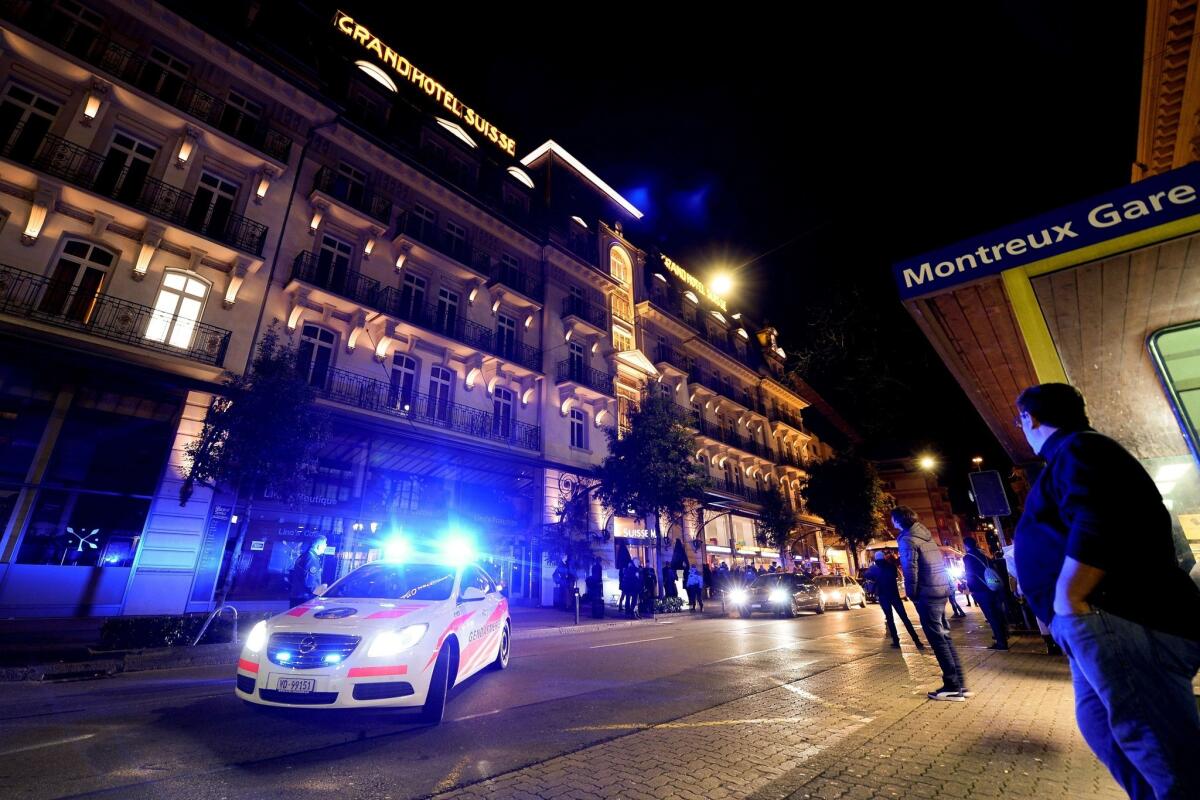Syria peace conference negotiators arrive in Switzerland

- Share via
MONTREUX, Switzerland – This fashionable lakeside city, known for its annual jazz festival, chic shops and tranquil alpine vistas, was abuzz Tuesday with eleventh-hour preparations for a long-anticipated international gathering aimed at halting Syria’s nearly three-year civil war.
The serene setting of rolling vineyards and snowcapped peaks along the banks of Switzerland’s Lake Geneva presented a jarring contrast to the apocalyptic tableau of Syria and its monochromatic expanses of rubble-strewn towns and neighborhoods roamed by gunmen.
Security was extremely tight at the cluster of downtown Montreux hotels where representatives of almost 40 nations — as well as a U.S.-backed Syrian opposition coalition — were scheduled to arrive for what is expected to be a largely ceremonial first day Wednesday of peace talks organized by the United Nations.
A massive contingent of international journalists was based at a center adjacent to the cordoned-off VIP zone. Dignitaries were to be shuttled through security to the majestic Montreux Palace hotel, a belle epoque monument facing the lake.
The gathering is to be the first face-to-face meeting between representatives of Syrian President Bashar Assad’s government and the opposition seeking to topple Assad.
There is little optimism about a major breakthrough with both sides and their foreign backers far apart on the central question of Assad’s future.
The Syrian government has made it abundantly clear it is not coming to Switzerland to negotiate its own demise. But that is what the deeply fragmented opposition demands, with some factions furious about the prospect of even sitting down with Assad’s representatives.
Assad has given no indication that he has contemplated ceding power. The Syrian leader offered his strongest indication to date, in a recent interview with Agence France-Presse, that he was considering running for reelection this year when his term expires.
“In short, we can say that the chances for my candidacy are significant,” Assad told AFP, according to a transcript published Tuesday by Syria’s official news agency.
As participants began arriving in Switzerland, the stunning decision a day earlier by U.N. Secretary General Ban Ki-moon to rescind his invitation to Iran under intense pressure from Washington and its allies was still resonating.
Russia’s foreign minister, Sergei Lavrov, said the abrupt about-face was a mistake “but not a catastrophe,” though it excluded one of the major regional players while far-off nations such as Mexico and South Korea were invited. Moscow still was optimistic that constructive dialogue could take place between the antagonistic parties, Lavrov told reporters in Moscow. Russia and Iran are both staunch allies of Assad.
Iranian officials were seething, but argued it was the U.N. and its chief who ended up humiliated and compromised.
“Ban Ki-moon damaged his own dignity and the status of the U.N.,” the official website of the Iranian parliament said in an editorial. “He showed that he is not neutral in Syria’s crisis.… This unpleasant event thickened the wall of distrust between Iran and the U.N.”
In another pre-conference flap, news agencies reported that the aircraft carrying Syria’s delegation, including Foreign Minister Walid Moallem, was delayed four hours Tuesday in Athens after a Greek firm refused to refuel the plane. The aircraft eventually took off.
That the conference is opening in Montreux instead of Geneva, the U.N.’s European headquarters on the other end of the fabled lake, is an odd quirk of circumstance. Once the U.N. set the start date of Jan. 22, officials discovered that most of the hotel rooms in Geneva had been booked because of a luxury watch fair. Montreux had ample hotel space.
The conference is scheduled to move to Geneva on Friday. That is when actual talks between Assad’s envoys and the opposition contingent are slated to begin in earnest.
With Islamic militants linked to Al Qaeda on the rise in Syria, each side in the negotiations has endeavored to position itself as a bulwark against terrorism, while branding its adversaries as terrorists.
No one seems to believe that the two sides will be able to hammer out plans for a transitional government, the ostensible purpose of the conference, as outlined in a 2012 summit in Geneva that set the groundwork for this week’s conference. A new government remains a future goal, perhaps an illusory one at this point. Damascus has never explicitly endorsed the concept of a transitional administration that could signal its own downfall.
But representatives of the United States and Russia, the two initiating states, see progress in the start of a peace process where there was no dialogue before. Diplomats are looking for the establishment of some confidence-building measures — temporary cease fires, an exchange of prisoners, bolstered aid access to besieged communities.
Even these proposed steps, however, are difficult to pull off given the many players on the battlefield and the toxic atmosphere of mutual recrimination that now enshrouds Syria. Restoring some semblance of trust among the antagonistic parties may be the most daunting barrier facing negotiators.
Twitter: @mcdneville
Times staff writer Sergei L. Loiko in Moscow and special correspondent Ramin Mostaghim in Tehran contributed to this report.
More to Read
Sign up for Essential California
The most important California stories and recommendations in your inbox every morning.
You may occasionally receive promotional content from the Los Angeles Times.










